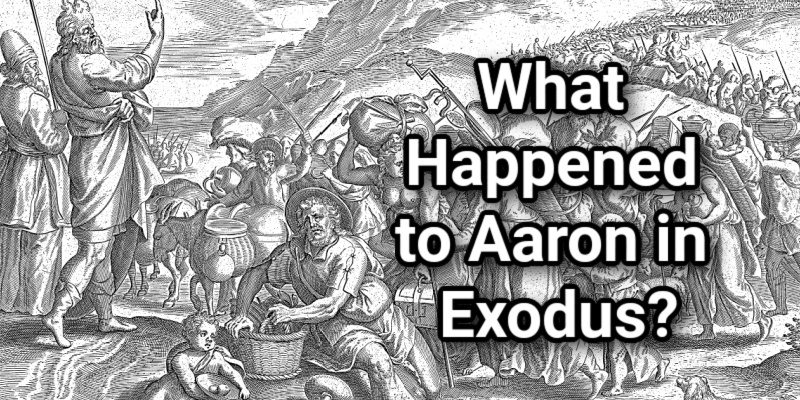What happened to Aaron in Exodus? Lord’s Library editors offer an introduction with key Bible verses and commentary.
As the brother of Moses and the inaugural high priest of the Israelites, Aaron’s story in the Bible is pivotal to the Exodus. The Aaron story in the Bible is primarily chronicled in the books of Exodus, Leviticus, Numbers, and Deuteronomy, presenting portraits of his life from Egypt’s bondage to the wilderness wanderings.
Aaron’s calling came when God chose Moses to lead the Israelites out of Egyptian bondage. Moses expressed concern to God over his speaking abilities. See Exodus 4:14-15: “And the anger of the LORD was kindled against Moses, and he said, Is not Aaron the Levite thy brother? I know that he can speak well. And also, behold, he cometh forth to meet thee: and when he seeth thee, he will be glad in his heart. And thou shalt speak unto him, and put words in his mouth: and I will be with thy mouth, and with his mouth, and will teach you what ye shall do.”
What Happened to Aaron in Exodus?
As a result, God appointed Aaron as his spokesman in Exodus 4:16: “And he shall be thy spokesman unto the people: and he shall be, even he shall be to thee instead of a mouth, and thou shalt be to him instead of God.” This partnership marked the beginning of Aaron’s journey as a prophet and a key figure in the Exodus. This partnership established Aaron as an essential figure in the communication between God, Moses, and the people.
One of Aaron’s first significant actions in the Exodus story is his participation in confronting Pharaoh. Aaron, carrying a rod as a symbol of his authority through God, performs miracles before Pharaoh to demonstrate God’s power. In a notable episode, Aaron casts down his rod before Pharaoh and his servants, turning it into a serpent. See Exodus 7:10: “And Moses and Aaron went in unto Pharaoh, and they did so as the LORD had commanded: and Aaron cast down his rod before Pharaoh, and before his servants, and it became a serpent.”
Throughout the plagues that God sends upon Egypt, Aaron is instrumental in executing God’s commands. Alongside Moses, Aaron stretches out his hand to bring about some of the plagues, including turning the waters of Egypt into blood in Exodus 7:19: “And the LORD spake unto Moses, Say unto Aaron, Take thy rod, and stretch out thine hand upon the waters of Egypt, upon their streams, upon their rivers, and upon their ponds, and upon all their pools of water, that they may become blood; and that there may be blood throughout all the land of Egypt, both in vessels of wood, and in vessels of stone.”
He also summons frogs to cover the land in Exodus 8:6: “And Aaron stretched out his hand over the waters of Egypt; and the frogs came up, and covered the land of Egypt.” Finally, in Exodus 8:16-17 Aaron turns dust into lice that afflicted men and beasts in Egypt: “And the LORD said unto Moses, Say unto Aaron, Stretch out thy rod, and smite the dust of the land, that it may become lice throughout all the land of Egypt. And they did so; for Aaron stretched out his hand with his rod, and smote the dust of the earth, and it became lice in man, and in beast; all the dust of the land became lice throughout all the land of Egypt.”
These divine acts serve not only to pressure Pharaoh but also to affirm the power of the God of Israel over the gods of Egypt, with Aaron acting as a key tool in the Lord’s toolbelt.
Beyond the miracles and plagues, Aaron’s role in the Exodus encompasses status among the Israelites. As Moses’ brother and representative, Aaron helped to rally the people, addressing their doubts and fears throughout the journey. His presence provided a sense of stability and trust in God’s promise, reinforcing Moses’ leadership and the collective resolve of the Israelites to pursue freedom from slavery.
Lord's Library is a Christian resource hub. Our editors use a variety of internet research methods like search engines, audio and video, AI, consultations with ministry leaders in the field, and more. Lord's Library should never be a substitute for reading your Bible daily as the Scriptures are to be our final authority on all matters. Lord's Library participates in affiliate programs. We may make a small commission from products purchased through this resource.
- What Does the Bible Say About Achievements? With Key Scriptures - April 11, 2025
- What does the Bible Say About Abortion? With Key Scriptures - April 11, 2025
- Prosperity Gospel Meaning in the Scriptures: Is it Biblical? - April 7, 2025












